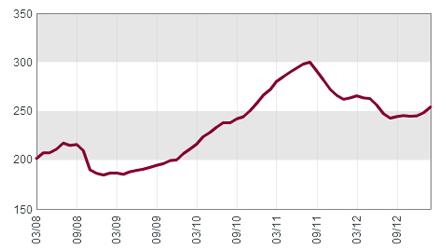I've read my fair share of articles pitching "exotic" investment ideas. Most of these I throw in my virtual waste basket, not buying into the too-good-to-be-true story.
But when there is a way to invest in a rare asset class through more traditional means, I'm all ears. Especially if the asset has outpaced returns delivered by the broad market, it is at least worth a look.
Such is the case with wine. Few investors buy wine for the express purpose of storing it for years and selling it later at a profit. To be sure, the throngs of investors in stocks and bonds dwarf the wine investors.
But it is still surprising just how sophisticated, and seemingly large, this niche investment class has become. Wine investments haven't yet become mainstream, but the popularity of this investment class is most definitely on the rise. And the outstanding performance of publicly-traded companies with extensive wine portfolios – such as Constellation Brands (NYSE:STZ) – suggests investors aren't just looking at the ultra-exclusive end of the market.
That said, if you have $20,000 to $250,000 burning a hole in your pocket, take a look at The Wine Investment Fund or the Fine Wine Fund. The latter's website states that the fund has returned an average annual return (net of fees) of 4% since inception (equivalent to a 24% total gain) in September 2006. That's better than the S&P 500, which is up just 15% over the same time frame.
Most wine funds are comprised exclusively of French Bordeaux, which has a long history of rising in value, due in large part to the mix of quality and exclusivity (there are only around three dozen producers of investment grade Bordeaux, according to Thompson Reuters).
Some funds pay investors dividends in cash, some pay in wine. But be forewarned – given the current price for many first-growth Bordeaux, those wine dividends might not fill too many slots in the wine cellar.
If you want to see what fine wines are trading for, the London International Vintners Exchange provides the market's leading valuation and exchange platform, called LIV-ex. For everyday Joes they have a Cellar Watch service that provides subscribers the software to track the value of their own wine cellar, as well as access trading prices from the professional LIV-ex platform.
LIV-ex has four indices, each tracking a different group of wines. What's clear in perusing the returns of these indices is that wine investors can absolutely make money.
The best performing index, the LIV-ex Bordeaux 500, is up 30.1% over the past five years (through January 31, 2013) as compared to just a 7.2% rise in the S&P 500.
LIV-ex Bordeaux 500: You Can Make Money In Wine

I'm not recommending you go out and buy a wine fund this month, or a case of 2005 Château Haut-Brion. If we could achieve "… bond-like security with stock-like returns," as the author of Investing in Liquid Assets David Sokolin has suggested, then that might be an attractive investment.
But there are other, more traditional ways to invest in wine. I just sent a very attractive, and low-risk, wine-related recommendation to subscribers of Pay Dirt. It's not exotic, but it is extremely interesting – and not just because it's returned 300% over the last decade. You can learn more here.
 Facebook
Facebook
 Twitter
Twitter